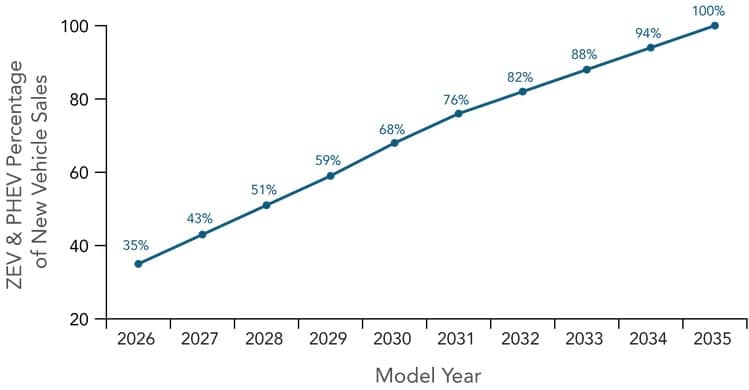California Adopts Rule to Transition Away From Combustion Engine Vehicles by 2035

The California Air Resources Board on Aug. 25 adopted aggressive regulations to shift away from gasoline and diesel engine vehicles, requiring automakers to sell only zero-emission vehicles by the mid of the next decade. The board approved the Advanced Clean Cars II rule, which requires zero-emission vehicles to constitute all new light-duty vehicle sales by 2035.
The regulations require manufacturers to offer increasing percentages of zero-emission vehicles in their fleets between 2026 and 2035. Such vehicles must make up 35 percent of those offered in the 2026 model year, 68 percent of vehicles offered in 2030, and 100 percent of new vehicles for the 2035 model year.
The Clean Air Act allows California to adopt its own vehicle emissions rules, subject to permission from the U.S. Environmental Protection Agency. California’s earlier CO2 levels for new cars have been accepted by 17 other states, accounting for 40 percent of new car sales.
The regulation is expected to result in a 25 percent reduction in smog-forming pollution from light-duty vehicles by 2037 and a 50 percent reduction in greenhouse gas emissions by 2040. The regulation will reduce climate-warming pollution by 395 million metric tons from 2026 through 2040, equivalent to avoiding the emissions of 915 million barrels of petroleum.
To encourage consumers to switch to electric vehicles, the board offers several incentive programs, such as rebates on new and used clean cars, funding for charging stations, and alternative forms of transportation, such as car sharing and ride-hailing. The state legislature has approved $2.7 billion in the fiscal year 2022-23, and $3.9 billion over three years, to support ZEV adoption and clean mobility options for disadvantaged communities.
Battery-electric vehicles are expected to reach cost parity with conventional vehicles by 2030, according to the board’s analysis and over the first 10 years of ownership, consumers could save up to $7,900 in maintenance and operational costs.
Trade group, Alliance for Automotive Innovation noted that “California’s EV sale mandates are still very aggressive” despite decades of supportive EV policies and would be challenging. The group pointed out that accomplishing the EV goals is linked to a number of external factors including inflation, infrastructure, supply chains, labor, critical mineral availability, and semiconductor shortage.
EnerKnol Pulses like this one are powered by the EnerKnol Platform—the first comprehensive database for real-time energy policy tracking. Sign up for a free trial below for access to key regulatory data and deep industry insights across the energy spectrum.
ACCESS FREE TRIAL